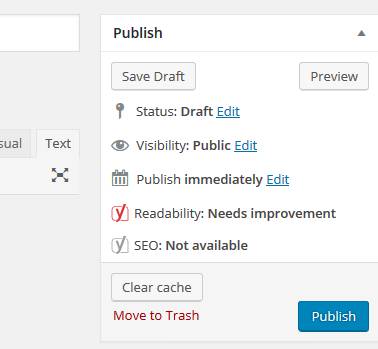
 Let’s face it, unless you are an SEO fanatic, and maybe if you are, Yoast sucks.
Let’s face it, unless you are an SEO fanatic, and maybe if you are, Yoast sucks.
“Write better content”.
That’s one of the promises of Yoast, a company that produces a series of plugins for WordPress designed to optimize content for the wildly popular publishing platform. Yoast, which was founded by thirty-something developer Joost de Valk in 2010, is currently being used by four-million websites, including Cantech Letter.
I downloaded Yoast…well I can’t remember when, to be honest. As a company that operates on a shoestring, I think I installed the plugin to better help me understand the world of SEO, since we weren’t in a position to hire someone to do that. It was one of my late evening pastimes to learn about the subject.
Let’s face it: Yoast sucks
For those who don’t know, SEO stands for Search Engine Optimization, and while I think writing for bots that happen by our site from time to time instead of people is a slippery slope, I also didn’t want Cantech to be behind the times. After all, maybe there was something simple we were missing that could be easily corrected, a key word or two here, a snippet of code there. Because of this, I became a student of the routinely excellent SEO site Moz, which I would recommend to anyone. Yoast? Well, I’m not so sure.
One of the updates to Yoast has been confounding me for months now. Though I don’t remember when I downloaded it, there has been a Yoast widget positioned inside the box we use to publish articles at Cantech Letter. It looks like this:

As you can see, the plugin offers advice what developers call “content analysis” of each post. This first got my attention a few months ago and has baffled me since. Almost without fail, Yoast’s opinion of Cantech Letter content is the stern, dry assessment that it “Needs Improvement”.
We write an article about the evolutionary history of cellular organisms? “Needs improvement”. We write an article about how Donald Trump has ruined political science. “Needs improvement”, says Yoast. A 1200 word think piece about the privacy aspects of smart cities? “Needs improvement”.
After months of seeing this needling assessment I decided to try an experiment. I would find a collection of words generally accepted to be masterpiece -a no-doubt about it piece of literature- and load it into Yoast and see what happened. Ernest Hemingway’s “The Snows of Kilimanjaro” seemed to fit the bill. For those who don’t know, “The Snows of Kilimanjaro” was first published in Esquire magazine in 1936 and generally regarded as one of Hemingway’s masterpieces, alongside “”The Sun Also Rises” and “For Whom the Bell Tolls”. I posted the entire 9000 plus word story as though it were a new Cantech Letter article and hit “Save Draft”.
“Needs improvement”.
Something was up.
After the experiment with “The Snows of Kilimanjaro” I decided to dig a little deeper into what Yoast was actually looking for and measuring its grades against. I got some clues on the company’s website, where it described what the software actually does.
“Apart from checking the SEO friendliness of your post, Yoast SEO now also analyzes the readability of the copy you wrote! It checks the length of your sentences and paragraphs, and whether you use transition words or sub headings. Moreover it assesses if you don’t use passive voice too often. On top of that it calculates the Flesch Reading Ease score. For now, the checks for passive voice, transition words and Flesch Reading Ease are only available in English, German and Dutch.”
So what is this Flesch Reading Ease score? A little digging showed me it’s actually called the “Flesch–Kincaid readability tests” and it was were developed by the U.S. Navy in the 1970s to assess how difficult technical manuals were to read. But here’s the thing about the test: the higher the score, the easier the reading level, meaning a score of 90 to 100 is understood by grade schoolers and a score of zero to thirty is understood by university graduates.
So, as Wikpedia explains, the sentence “the cat sat on the mat” has a score of 116, while one passage from “Moby Dick” actually has Flesch–Kincaid readability score of −146.77. To be blunt about it, Yoast is a dummy test.
The phrase “write better content” means something different to us than it does to Yoast, and it probably does to you, too. Sure, we want to be clear to everyone, but I am not instructing our writers to write in short declarative single syllable sentences to get there. The most important lesson for online publishers, I think is to communicate to the audience you want to reach. That is, of course, unless your passion is dogs sitting on logs, pigs wearing wigs, or cats sitting on mats.
File under: Yoast sucks, Yoast sucks Hemingway
Comment
One thought on “I loaded a Hemingway masterpiece into Yoast and here’s what happened”
Leave a Reply
You must be logged in to post a comment.



 Share
Share Tweet
Tweet Share
Share




Interesting experiment